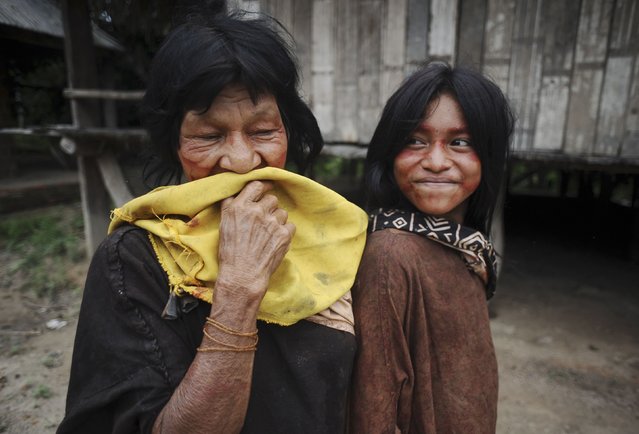
Ashaninka Indians pose for a photograph in the village of Kokasul along the Envira river in Brazil's northwestern Acre state, March 16, 2014. Many indigenous groups, including the Huni Kui, Ashaninka, and Madija, live in villages in the Brazilian rainforest near the border with Peru. Over the past three years, the Ashaninka and Madija say that they have seen more and more incursions on their territory from uncontacted tribes, defined by Survival International as groups who have no peaceful contact with mainstream society. The “Bravos”, or “Braves”, as uncontacted Indians are called in the region, carry out raids on other villages, putting the communities along the Envira River on permanent alert. Leaders of the Ashaninka tribe have asked the government and NGOs for help in controlling what they consider an encroachment on their area by these uncontacted indigenous groups, stating that the movement of these other tribes is the result of pressure caused by illegal logging across the border in Peru. (Photo by Lunae Parracho/Reuters)
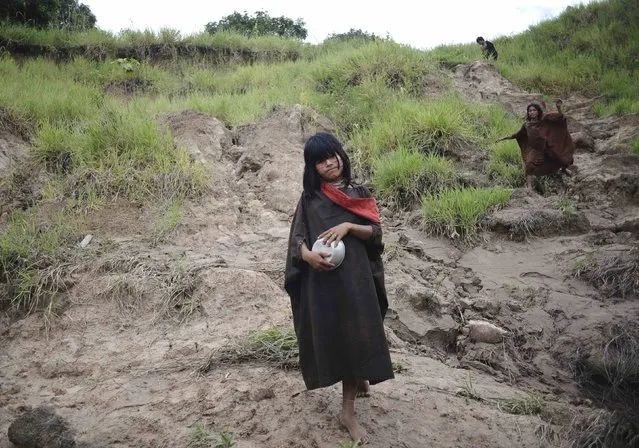
Ashaninka Indian children run down the bank of the Envira river to greet a boat near their village of Simpatia in Brazil's northwestern Acre state, March 13, 2014. (Photo by Lunae Parracho/Reuters)
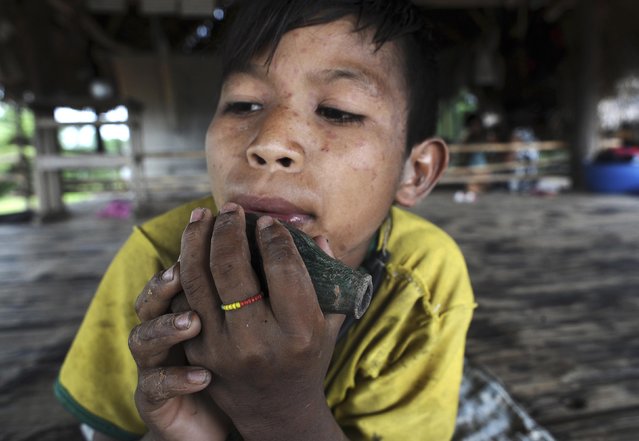
Binai, son of Cacique Omina of the Madija tribe, plays a ceramic flute made by uncontacted Indians which his father found and gave to him, in Igarape do Anjo in Brazil's northwestern Acre state, March 12, 2014. (Photo by Lunae Parracho/Reuters)
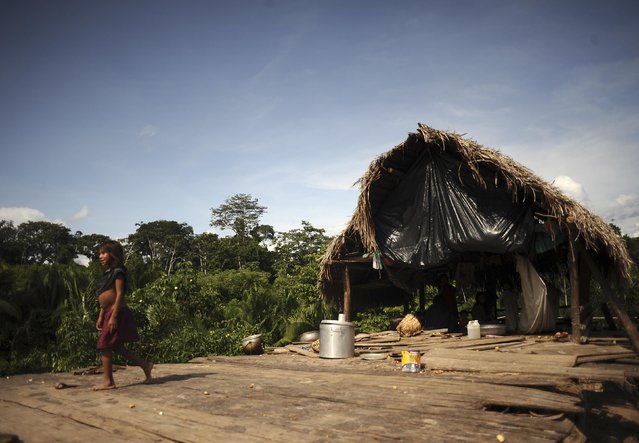
A Madija Indian child walks from one of the village huts which is a frequent target of raids by uncontacted Indians in the village of Dsama, along the Envira river in Brazil's northwestern Acre state, March 11, 2014. (Photo by Lunae Parracho/Reuters)
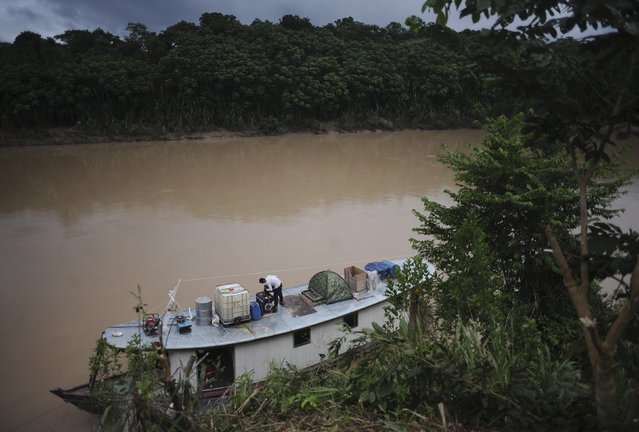
The boat in which Ashaninka Indian leaders travelled to inspect the limits of their territory is tied to the bank of the Envira river in Brazil's northwestern Acre state March 15, 2014. (Photo by Lunae Parracho/Reuters)
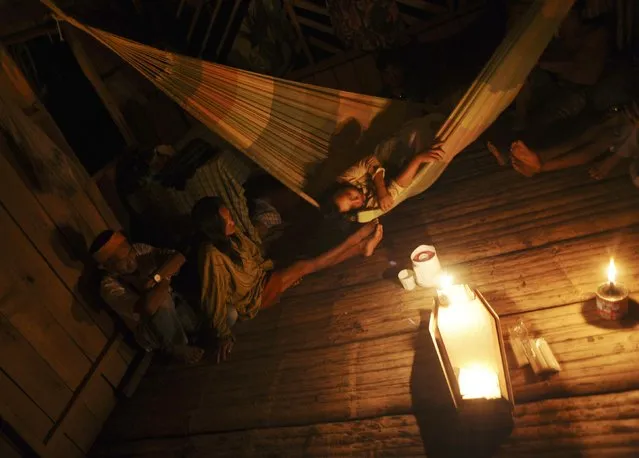
Huni Kui Indians sit by the coffin of a newborn baby who died after being born on a boat on the Envira river as the mother tried to reach a hospital, in the village of Me Txanava in Brazil's northwestern Acre state, March 7, 2014. (Photo by Lunae Parracho/Reuters)
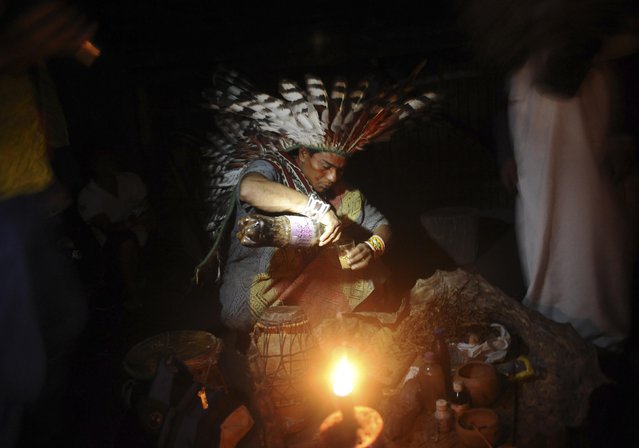
A Huni Kui Indian prepares a drink known as nixi pae or ayahuasca to use in a healing ritual in the village of Novo Segredo along the Envira river of Brazil's northwestern Acre state, March 8, 2014. (Photo by Lunae Parracho/Reuters)
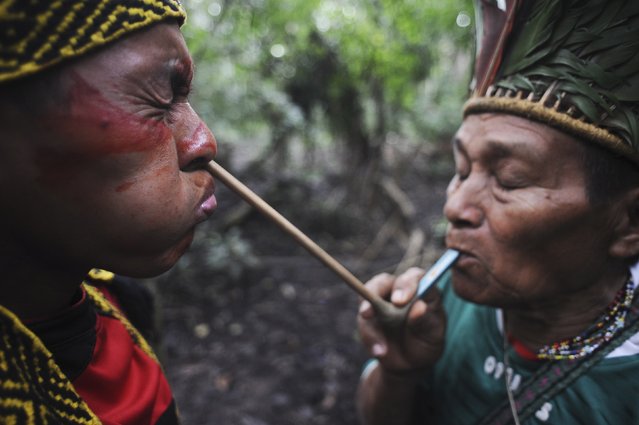
A spiritual leader (R) of the Huni Kui Indian tribe blows an herbal powder into the nose of a tribal member during a ceremony outside the village of Novo Segredo along the Envira river of Brazil's northwestern Acre state, March 9, 2014. (Photo by Lunae Parracho/Reuters)
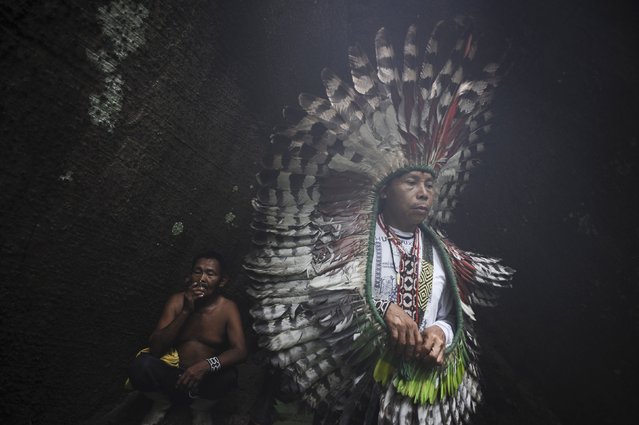
A spiritual leader (R) of the Huni Kui Indian tribe performs a ceremony for a sacred samauma (silk-cotton) tree outside the village of Novo Segredo along the Envira river in Brazil's northwestern Acre state, March 9, 2014. (Photo by Lunae Parracho/Reuters)
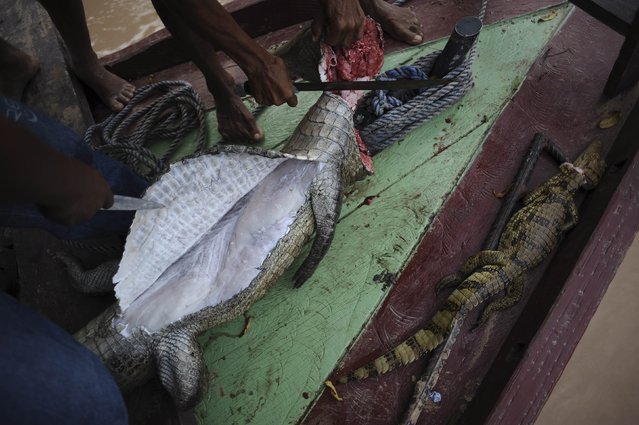
Madija Indians clean a caiman to eat, on a boat on the Envira river in Brazil's northwestern Acre state, March 14, 2014. (Photo by Lunae Parracho/Reuters)
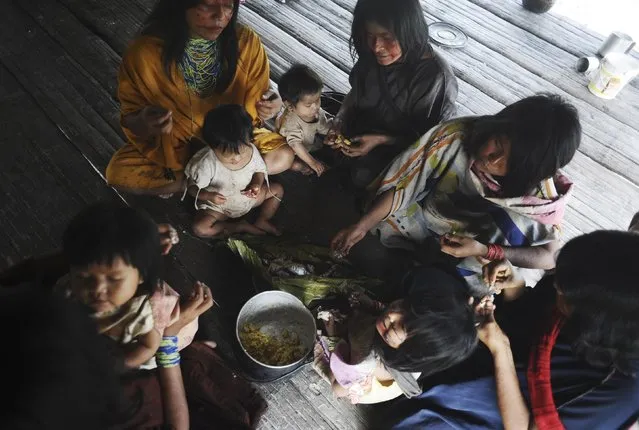
Ashaninka Indians eat a meal at their home in the village of Kokasul along the Envira river in Brazil's northwestern Acre state, March 16, 2014. (Photo by Lunae Parracho/Reuters)
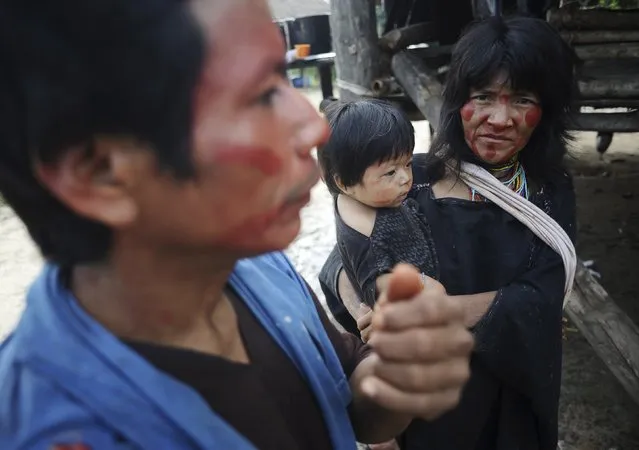
Ashaninka Indian couple Poshe (L) and Biana talk about the kidnapping of their daughter Sawatxo, some years ago, by uncontacted Indians, in their village Simpatia, along the Envira river in Brazil's northwestern Acre state, March 16, 2014. (Photo by Lunae Parracho/Reuters)
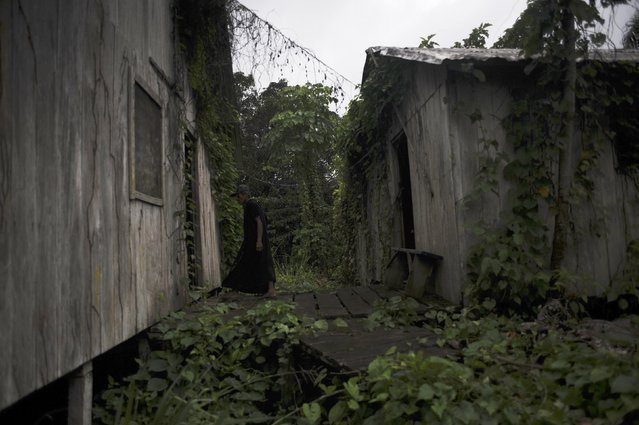
Ashaninka Indian, cacique (chief) Txate, walks between buildings of the former government base called the Envira Front of Ethno-environmental Protection along the Envira river in Brazil's northwestern Acre state, March 14, 2014. (Photo by Lunae Parracho/Reuters)
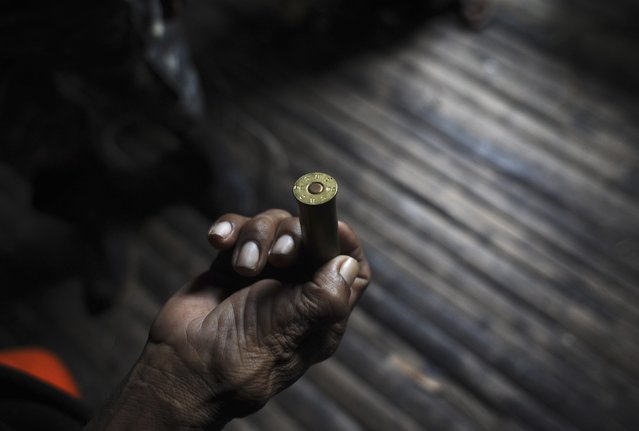
An Ashaninka Indian holds a shotgun cartridge he found on the grounds of the former government base called the Envira Front of Ethno-environmental Protection along the Envira river in Brazil's northwestern Acre state, March 14, 2014. (Photo by Lunae Parracho/Reuters)
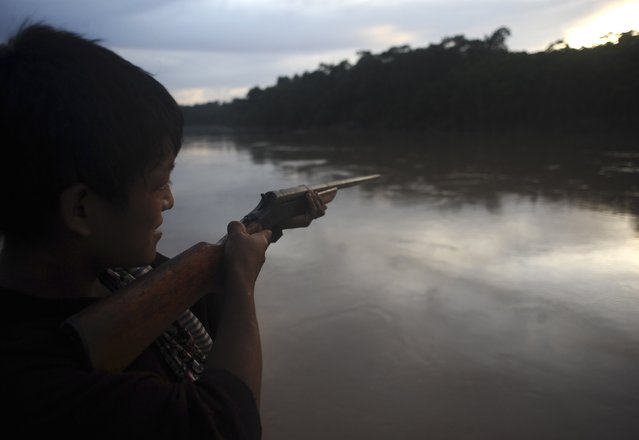
An Ashaninka Indian points his rifle across the Envira river on the grounds of a former government base called the Envira Front of Ethno-environmental Protection in Brazil's northwestern Acre state, March 14, 2014. (Photo by Lunae Parracho/Reuters)
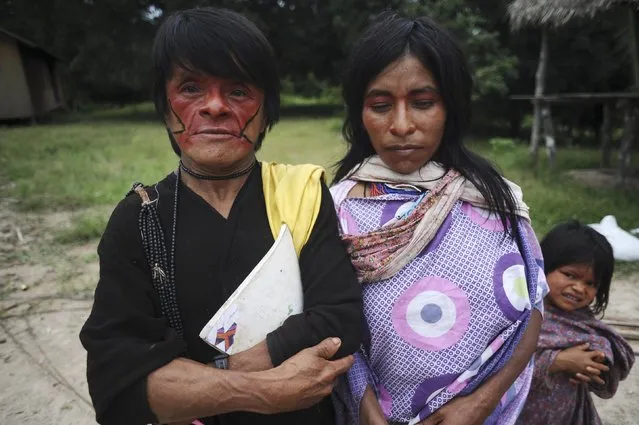
Ashaninka Indians pose for a photograph in the village of Kokasul along the Envira river in Brazil's northwestern Acre state, March 16, 2014. (Photo by Lunae Parracho/Reuters)
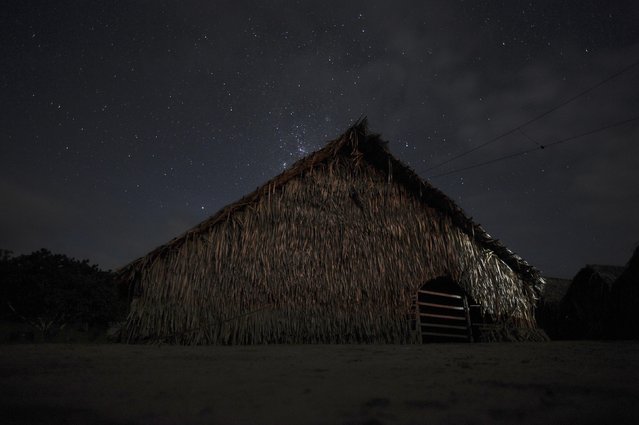
A view of the Shubua, or house of prayer, in the Huni Kui tribe's village of Me Txanava in Brazil's northwestern Acre state, March 6, 2014. (Photo by Lunae Parracho/Reuters)
04 Apr 2014 08:18:00,
post received
0 comments
